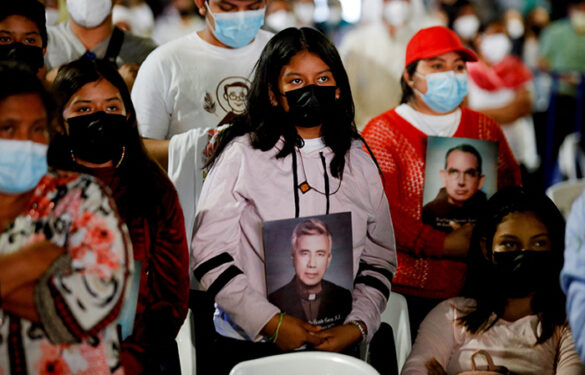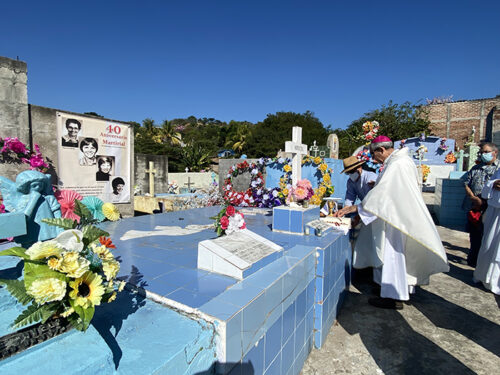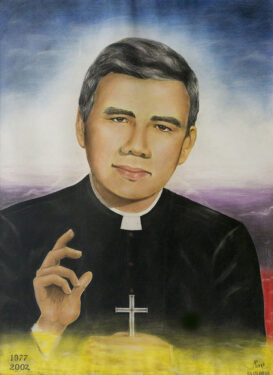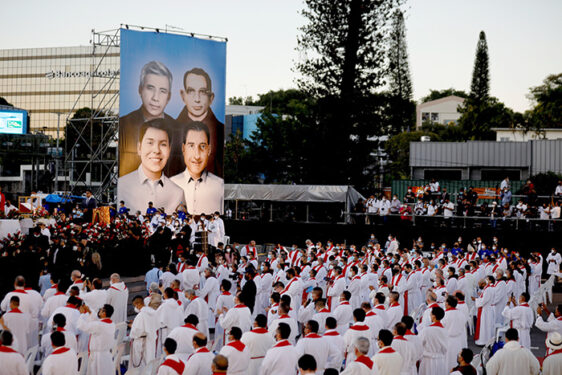
PROSPECT HEIGHTS — Martyred St. Óscar Romero, Archbishop of El Salvador from 1977 to 1980, is known worldwide for his peaceful stand against the Salvadoran government’s repression during the early days of the nation’s 12-year civil war.
But admirers of Archbishop Romero, who was assassinated in 1980, are quick to note that his ministry was inspired by his longtime friend and fellow priest, Father Rutilio Grande, who was murdered in 1977.
Father Grande’s own path to sainthood advanced Saturday, Jan. 22 with his beatification in San Salvador, along with two lay workers who died with him — Nelson Rutilio Lemus, 16, and Manuel Solórzano, 72, a sacristan.

Beatification is one of the final steps toward sainthood. Also beatified at the Jan. 22 ceremony was Father Cosme Spessotto of Italy, a Franciscan serving in El Salvador who was murdered in a separate incident in 1980.
Thousands filled Salvador del Mundo Plaza in San Salvador for the outdoor event. Among them was retired Auxiliary Bishop Octavio Cisneros of the Diocese of Brooklyn, who was already in El Salvador on unrelated business for the U.S. Conference of Catholic Bishops.
“It was moving for me because even before the ceremonies of beatification, I had the opportunity of traveling to the country,” Bishop Cisneros said. “I actually went to the place where they were shot — Father Rutilio and the two laypersons. From there I went to where their bodies are resting in El Paisnal.
“So it is very moving to think about a priest who is going toward the Sacrifice of the Mass, and actually sacrificed his own body and shed his own blood because of what he believed — preaching the gospel.”
A Legacy Inherited
Father Grande served his hometown, El Paisnal, about 27 miles north of San Salvador, and nearby villages. The beatification ceremony drew the priest’s relatives from the U.S., such as Ana Grande of Los Angeles.
In a telephone interview from El Paisnal prior to the ceremony, she explained that her father was Father Grande’s nephew.
“I didn’t get to meet him,” she said of her great uncle. “I am one of the last in my generation to be born. But I grew up knowing of him. We never really spoke about him as a saint, but we knew that he was somebody from whom we inherited a legacy.”
Ana Grande said illiteracy was rampant in the nation, so her uncle also taught people to read so that they could “understand the liberating message of the Bible.”

“So,” she continued, “because he was doing that, many people were threatened by the government or other folks who were not happy with this particular message.
“And so one of them was my father.”
Grande explained that, as a young man, her father became a member of the National Guard, which was cracking down on people considered hostile to the government.
“My father,” Grande added, “was obviously part of the government, and at one point he said, ‘Listen, I can’t stay here because my uncle is being threatened, and if I do, they might ask me to kill him. I don’t want to do that.’
“So my father migrated and he went to Los Angeles. That’s where he met my mother. And that’s how my family ended up in the U.S.”
But hostility grew against Father Grande, who was 48 years old on March 12, 1977. On that day, he was with Lemus, 16, and Solórzano, 72, traveling in a van to El Paisnal from the neighboring village of Aguilares when gunmen ambushed and killed them.
A Defining Moment
Father Manuel Rodriguez, pastor of Our Lady of Sorrows, Corona, is from the Dominican Republic, but he confirmed that Father Grande’s story is well-known among admirers of Archbishop Romero.
He noted that a lot of his parishioners have Salvadoran heritage, as do many members at his previous parish, Presentation of the Blessed Virgin Mary Church in Jamaica, Queens. He said Salvadorans throughout the Diocese of Brooklyn hold Archbishop Romero and Father Grande in the highest regard.
Father Rodriguez said they were longtime friends.
But Father Rodriguez noted that while Archbishop Romero supported Father Grande’s ministry, his installation as archbishop happened only a few weeks before his good friend was slain, and he had not yet become outspoken against government brutality.
“Up until that moment, he hadn’t taken any steps towards a radical transformation of his ministry,” Father Rodriguez said of the archbishop. “But, when Father Rutilio was assassinated, he understood that what was going on in El Salvador required a different approach.
“He understood that he needed to continue the work that Father Rutilio started by engaging with the people suffering from the reality of assassinations, summary executions, and persecution of those who opposed the abusive Salvadoran government.”
And, like Father Grande three years earlier, Archbishop Romero was assassinated on March 24, 1980, in San Salvador. He was 62.

